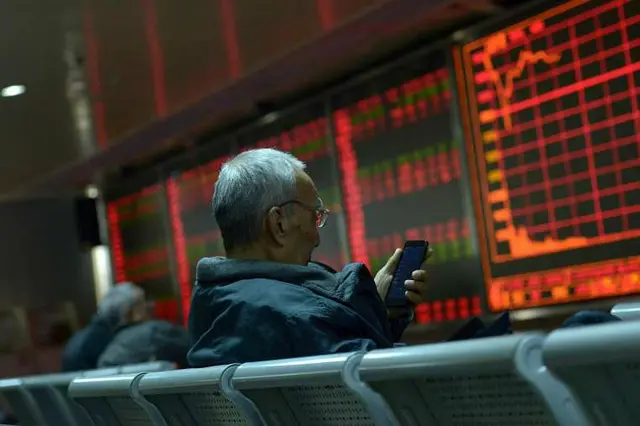(BLOOMBERG)Stocks from Japan to Australia climbed on Monday (Jan 25) as the rebound that sent global stocks surging by the most in 3 1/2 years continued in Asia, amid bets central banks will come to the rescue of turbulent financial markets. Oil extended gains above US$32 a barrel.
Rallies across the board in Asia saw the MSCI All-Country World Index embark on a third day of increases, after a 2 per cent jump in US shares on Friday contributed to the gauge's best day since June 2012.
The MSCI Asia Pacific Index gained 0.5 per cent as of 10:04 am Tokyo time, after a 3.5 per cent surge on Friday trimmed its third straight weekly drop to 1.4 per cent. Despite the slight comeback in the yen, Japanese shares rose a second day, with the Topix index increasing 0.7 per cent to be set for its highest close since Jan 19.
Energy producers and banks drove Australia's S&P/ASX 200 Index up 1.1 per cent amid the revival in crude oil, while New Zealand's S&P/NZX 50 Indexrose 0.7 per cent. The Kospi index in Seoul also gained 0.7 per cent.
Singapore's Straits Times Index was up 1.14 per cent at 2,606.42 as of 9:43 am,
Singapore reports on consumer prices on Monday, while Malaysian markets are closed for a holiday.
In Hong Kong, futures on the Hang Seng and Hang Seng China Enterprises indexes added at least 1.3 per cent at the end of last week. FTSE China A50 Index futures rose 0.9 per cent in Singapore, following a 1.4 pe rcent increase in the biggest US exchange-traded fund tracking Chinese stocks. The Shanghai Composite Index ended Friday up 1.3 per cent as China's government signaled it will curb overcapacity in industries such as coal that have been dragging down economic growth.
European Central Bank President Mario Draghi gave markets the lift they needed amid the worst start to a year on record for stocks around the world. His indication that stimulus could be boosted as soon as March, coupled with speculation China could ease policy further to soothe investors, fueled a surge across risk-asset classes at the end of last week, aided by the recovery in crude oil prices. While Bank of Japan Governor Haruhiko Kuroda played down the impact of the recent gyrations on his economy, economists are predicting the Federal Reserve will hold fire on interest rates when it meets this week.
"There will be some waiting and seeing among policy makers until they know how this market volatility will affect the global economy," Michael McCarthy, chief strategist at CMC Markets in Sydney, said by phone. "Given the depression in the markets, there's scope for the market to add to Friday's gains. We've got a very eventful week, with the BOJ and Fed meetings, so there's a lot for investors to react to. Volatility is likely to continue."
Less certain is the longer-term outlook for risk assets globally, according to Philip Borkin, a senior economist in Auckland at ANZ Bank New Zealand Ltd.
"One of my colleagues put it quite aptly recently when he stated that financial markets were almost like a tantruming toddler, and that central banks have been attempting to console them by rewarding them with another toy," Mr Borkin said in a client note on Monday. "Any parent would tell you that that is hardly the way to encourage long-lasting good behavior. At some stage, particularly if real activity data are still hanging in there OK, some tough love is required."
The rebound in crude - which saw Brent end Friday up more than 10 per cent - stoked gains in Middle Eastern stocks Sunday, with Dubai's DFM General Index climbing the most in more than a year and Saudi Arabia's benchmark soaring as much as 6.8 per cent. Crude remains the biggest source of revenue for the six-nation Gulf Cooperation Council. In Russia, which counts on energy for about 50 per cent of budget revenue, the MICEX index jumped 2.4 per cent on Friday to its highest level since Jan. 6.
The won led gains among Asian currencies, climbing 0.3 per cent after jumping 1.1 per cent on Friday.
The yen, which typically moves at odds with Japanese stocks, rallied 0.2 per cent to 118.59 per dollar following a 0.9 percent decline on Friday that capped its first weekly drop in three weeks.
Governor Kuroda said in an interview with Bloomberg TV in Davos that the turbulence in financial markets hadn't affected corporate behavior "unduly." He did, however, emphasize that the central bank is "carefully" watching markets for any potential impact on the real economy.
Data released on Monday showed Japan's annual trade deficit narrowed almost 80 per cent in December from a record as the cost of energy imports dipped and weakness in the yen spurred some gains in exports. Economists expect the BOJ to keep stimulus at current levels later this week.
 简体中文
简体中文

